|
|
|
Sort Order |
|
|
|
Items / Page
|
|
|
|
|
|
|
| Srl | Item |
| 1 |
ID:
139513


|
|
|
|
|
| Summary/Abstract |
Over the past six years, certain crowdsourcing efforts have begun to resemble, and perhaps augment, national security intelligence collection. As with any budding field, purveyors of intelligence crowdsourcing have been somewhat inconsistent in their attempts to develop new concepts to describe their actions, or to incorporate professional ethics into their activities. In this environment, where the line between traditional intelligence collection operations and public information collection efforts is increasingly blurred, steps must necessarily be taken to standardize proper intelligence crowdsourcing practices in order to avoid potential ethical quandaries even before they arise. As part of this effort, constructing a concise definition of crowdsourced intelligence becomes vital.
|
|
|
|
|
|
|
|
|
|
|
|
|
|
|
|
| 2 |
ID:
139510


|
|
|
|
|
| Summary/Abstract |
Our intention is to demonstrate, based on research, which elements support teamwork in HUMINT, or alternatively to show the advantage of using traditional intelligence methods. We conducted research among the operational intelligence officers of the intelligence services of Bosnia and Herzegovina, Montenegro, and Slovenia. These intelligence services, which evolved in the 1990s, witnessed the disintegration of the Socialist Federal Republic of Yugoslavia (SFRY) in 1992 and the establishment of new countries in the Balkan region, along with experiencing the area's cruelest wars. The Republic of Slovenia, the first to gain independence from the SFRY, was also the first to become a member of the European Union (EU) and North Atlantic Treaty Organization (NATO). Bosnia and Herzegovina underwent a terrifying war. The Dayton Agreements set the elements for the establishment of the new country's intelligence community but today “Dayton” clearly needs an appropriate update. Montenegro, a country with a long tradition, was not directly entangled in the Balkan wars of the ‘90s. Due to its geo-strategic position, however, its territory and inhabitants were often a logistics base or a refuge for various paramilitary groups and individual war criminals, whether in the direction of western Bosnia and Herzegovina or towards northeast Kosovo.
|
|
|
|
|
|
|
|
|
|
|
|
|
|
|
|
| 3 |
ID:
139506


|
|
|
|
|
| Summary/Abstract |
Today, as often in the past, the United States Intelligence Community (IC) continues to be a target of criticism for activities—interrogations and renditions—that appear to shock the conscience of many in the public as well as for developing surveillance capabilities that could violate the civil liberties of United States residents. Intelligence agencies are often portrayed as undermining the larger values of American society, pervaded by law-breaking and incompetence, and making only incidental contributions to the national security. Much of the academic literature on intelligence is narrowly focused on intelligence “revelations,” organizational histories of particular agencies, and on biographies of significant spies.
|
|
|
|
|
|
|
|
|
|
|
|
|
|
|
|
| 4 |
ID:
139509
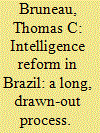

|
|
|
|
|
| Summary/Abstract |
In our edited book, Reforming Intelligence: Obstacles to Democratic Control and Effectiveness, Steven Boraz and I argued that intelligence should be analyzed as a subset of civil–military relations. In addition to the three reasons given there—that intelligence is a monopoly of the military in most non-democratic regimes; that even in older democracies including the United States the military plays a very large role in intelligence; and that both exist to ensure national security—another can be added, at least in the case of Brazil, that while democratic civilian control has been achieved, minimal attention and commitment are given to achieving effectiveness.
|
|
|
|
|
|
|
|
|
|
|
|
|
|
|
|
| 5 |
ID:
139512
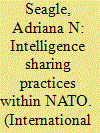

|
|
|
|
|
| Summary/Abstract |
The evolution of intelligence sharing within the North Atlantic Treaty Organization (NATO) reveals periods of tension, relaxation, and intense cooperation. Historically, the relationship among the United States, France, and the United Kingdom regarding intelligence sharing, especially during the Cold War, has not been one of trust and mutual cooperation. The mistrust of NATO's allies in the American deterrent strategy related not to Washington's willingness to keep its commitment to defend Europeans, but rather to the idea that in an event involving nuclear weapons “an American politician would never exchange the survival of Detroit for that of Paris.”
|
|
|
|
|
|
|
|
|
|
|
|
|
|
|
|
| 6 |
ID:
139507
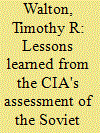

|
|
|
|
|
| Summary/Abstract |
Many scholars and other observers claim that the Central Intelligence Agency (CIA) fundamentally misunderstood important aspects of the Soviet Union, and, in particular, did not anticipate its collapse in 1991. Critics allege, among other things, that CIA analysts did not correctly gauge the vital issue of the extent to which the USSR's economy could—or could not—support a significant military threat.
|
|
|
|
|
|
|
|
|
|
|
|
|
|
|
|
| 7 |
ID:
139511
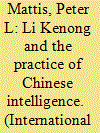

|
|
|
|
|
| Summary/Abstract |
The conventional story of Chinese intelligence follows two threads. The first narrative is Kang Sheng's prostitution of the intelligence services in support Mao Zedong's efforts to consolidate control over the Chinese Communist Party from the 1930s through the Cultural Revolution. For acts that would earn him the moniker of “China's [Lavrentiy] Beria,” Kang helped Mao, and later the Gang of Four, unleash a Stalin-esque terror against the Great Helmsman's rivals. The second narrative is China's supposedly unique approach to collecting intelligence by eschewing professionals and laying down a blanket of amateur collectors. Likened to a directed band of beachcombers, China encourages its citizens to go forth and, when they return, Chinese intelligence officers await to collect the loose grains of sand and assemble them into a coherent mosaic of intelligence. But these two threads conceal more than they reveal about the modern Chinese intelligence services and their operations.
|
|
|
|
|
|
|
|
|
|
|
|
|
|
|
|
| 8 |
ID:
139515


|
|
|
|
|
| Summary/Abstract |
A frigid Antarctic wind battered Rio Hondo throughout the night and into the next day. I awoke in the morning and could hear the windows being rattled by its gusts. Today was going to be a cold one. Thank heaven, the motel was warm.
|
|
|
|
|
|
|
|
|
|
|
|
|
|
|
|
| 9 |
ID:
139508


|
|
|
|
|
| Summary/Abstract |
A number of academics say think tanks have little or no influence on public policy. In 1984, for example, Yehezkel Dror rated the performance of think tanks as being rather disappointing in terms of their ability to influence policy. But an era of increasing financial constraints upon governments around the world, resulting in diminishing state budgets and cutbacks in the state machinery, has exerted negative effects upon most states' ability and role in policy identification, formulation, and implementation.
|
|
|
|
|
|
|
|
|
|
|
|
|
|
|
|
| 10 |
ID:
139505
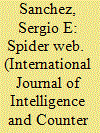

|
|
|
|
|
| Summary/Abstract |
Some U.S. counterintelligence officials fear that terrorist groups such as al-Qaeda may employ some of the same tactics, techniques, and procedures (TTPs) of intelligence collection as its state adversaries. Indeed, according to Justin R. Harber, “al-Qaeda training media include lessons on how to collect open source intelligence, conduct surveillance, interrogate detainees, and recruit agents working in a foreign government. Moreover, others argue that al-Qaeda—“… the most backward, barbaric, bloodthirsty, and oppressive terrorist group on earth”—is under-resourced, given the United States's “… massive, sprawling, multi-billion-dollar intelligence gathering bureaucracy.
|
|
|
|
|
|
|
|
|
|
|
|
|
|
|
|
| 11 |
ID:
139514


|
|
|
|
|
| Summary/Abstract |
In 1921 Albania a major game was afoot: that of the first political elections, which took place between February and April 1921. For Albanian officials, the initiation of an electoral process before the long anticipated international recognition of the independence and integrity of Albania and the final delimitation of the Albanian–Greek frontier took place was imperative. The main reason was Albania's territorial dispute with Greece. The participation of the inhabitants of the disputed Southern Albania (Gjirokastër and Korçë regions) in the elections was meant to prove their Albanian national sentiment. Conversely, their abstention from voting could be disastrous for the Albanian state, as it might prove that the region's inhabitants instead desired union with Greece. Great Britain's then-envoy in Albania, Harry Eyres, informed his government that the Muslims of the Korç
|
|
|
|
|
|
|
|
|
|
|
|
|
|
|
|
|
|
|
|
|